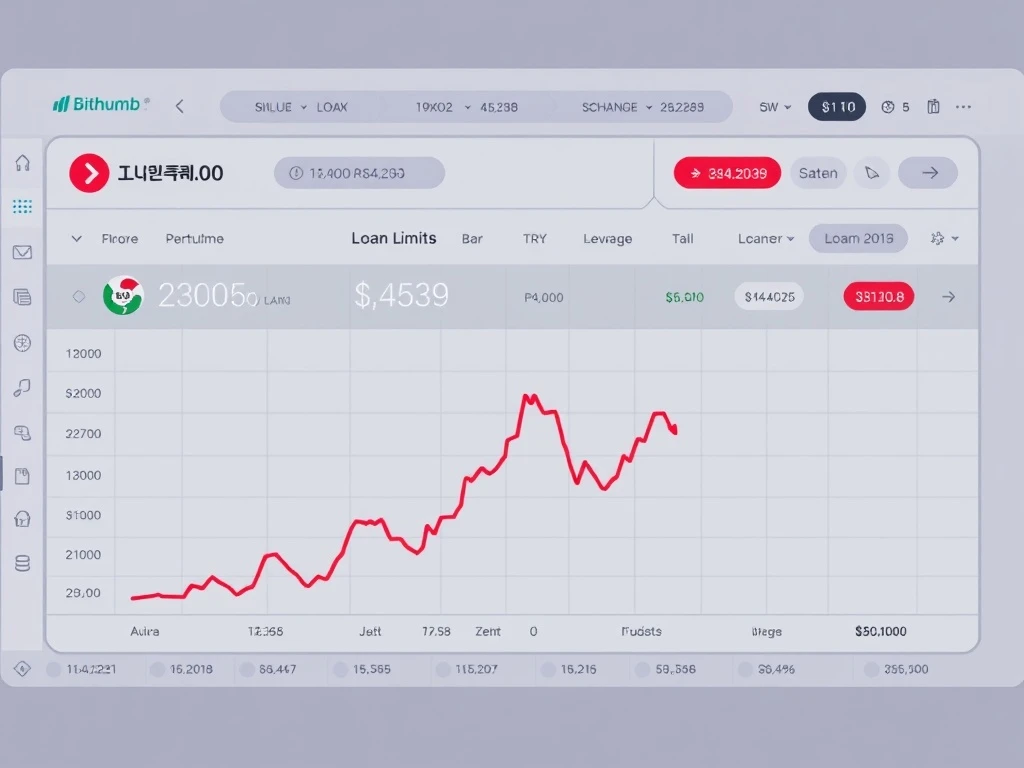Bithumb Crypto Lending Faces Drastic Cuts: South Korea Imposes Crucial Limits

Investors in the South Korean cryptocurrency market face significant changes. Leading exchange Bithumb has drastically altered its **Bithumb crypto lending** service. These adjustments follow intense scrutiny from regulators. The move notably slashes leverage and reduces loan limits. This reflects a broader effort to mitigate investor risk within the digital asset space.
Bithumb Crypto Lending Undergoes Major Overhaul
Bithumb recently tightened rules for its month-old crypto lending service. This action involved halving leverage and sharply reducing loan limits. The exchange initially suspended the service on July 29. It cited “insufficient lending volume” as the reason. However, the service resumed on Monday, August 5. Bithumb stated it made adjustments to protect investors. These changes also aim to improve service quality.
The exchange cut the **maximum leverage ratio** from 4x to 2x. Furthermore, it reduced the **maximum lending amount**. This dropped from 1 billion won (approximately $726,000) to 200 million won (about $145,000). This represents an 80% reduction. Significantly, this new borrowing cap applies universally. It even affects investors with over 100 billion won in cumulative trading volume. This volume accumulated over the past three years. Consequently, the changes impact a wide range of users.
South Korea Crypto Regulation Intensifies
Regulatory bodies in South Korea are actively shaping the crypto landscape. On July 31, a crucial development occurred. South Korea’s Financial Services Commission (FSC) and Financial Supervisory Service (FSS) formed a joint task force. This task force includes the Korea Institute of Finance. Local exchanges also participate. Their primary goal is to draft “Virtual Asset Lending Service Guidelines.”
The task force will include members from key regulatory bodies. It will also draw from the Digital Asset eXchange Alliance (DAXA). DAXA represents South Korea’s five largest exchanges. The group plans to incorporate international standards. They will also consider existing stock market regulations. Their efforts aim to address specific needs of South Korea’s crypto market. The guidelines will cover several critical areas:
- **Leverage limits**
- **Asset eligibility**
- **Risk transparency**
Authorities have also urged exchanges to re-evaluate high-risk services. This specifically includes those with excessive **crypto leverage**. Services involving fiat-based loans are also under review. Bithumb reportedly reviewed its service terms with regulators. It did so before resuming operations under these new, stricter limits.
Impact on Crypto Loan Limits and Market Dynamics
The reduction in **crypto loan limits** by Bithumb reflects a cautious approach. This strategy prioritizes investor safety. It also aims to align with emerging regulatory frameworks. Such moves could influence other exchanges. They might adopt similar risk-mitigation strategies. This could lead to a more stable yet potentially less accessible lending market. However, it fosters greater trust and compliance.
The regulatory push aims to standardize virtual asset lending. It seeks to reduce speculative risks. These risks often accompany high leverage products. The market may see a shift. Investors might move towards more conservative strategies. This emphasis on prudence could define the future of crypto lending in the region. It also highlights the growing maturity of the crypto market.
South Korea’s Growing Crypto Adoption
Despite increased regulation, crypto adoption remains strong in South Korea. A report from the Hana Institute of Finance revealed compelling statistics. More than one in four South Koreans, aged 20 to 50, own crypto. On average, crypto assets account for 14% of their financial portfolios. The highest ownership rate stands among people in their 40s at 31%. This is followed closely by those in their 30s and 50s.
South Korean retail investors are also showing a notable trend. They are shifting investments from US Big Tech to crypto-linked stocks. Their share of the top 50 net-bought equities rose significantly. It climbed from 8.5% in January to 36.5% in June. This figure eased slightly to 31.5% in July. This sustained interest underscores the importance of robust **South Korea crypto regulation**. It ensures a safer environment for this expanding investor base.
Looking Ahead: A Regulated Future for Virtual Asset Lending
The actions taken by Bithumb and South Korean regulators signal a clear direction. They are moving towards a more regulated and secure **virtual asset lending** environment. These guidelines will establish clear boundaries. They will protect investors from excessive risks. This proactive stance could set a precedent for other nations. It fosters a more transparent and sustainable crypto ecosystem. Ultimately, these measures aim to build long-term confidence in digital asset services.








